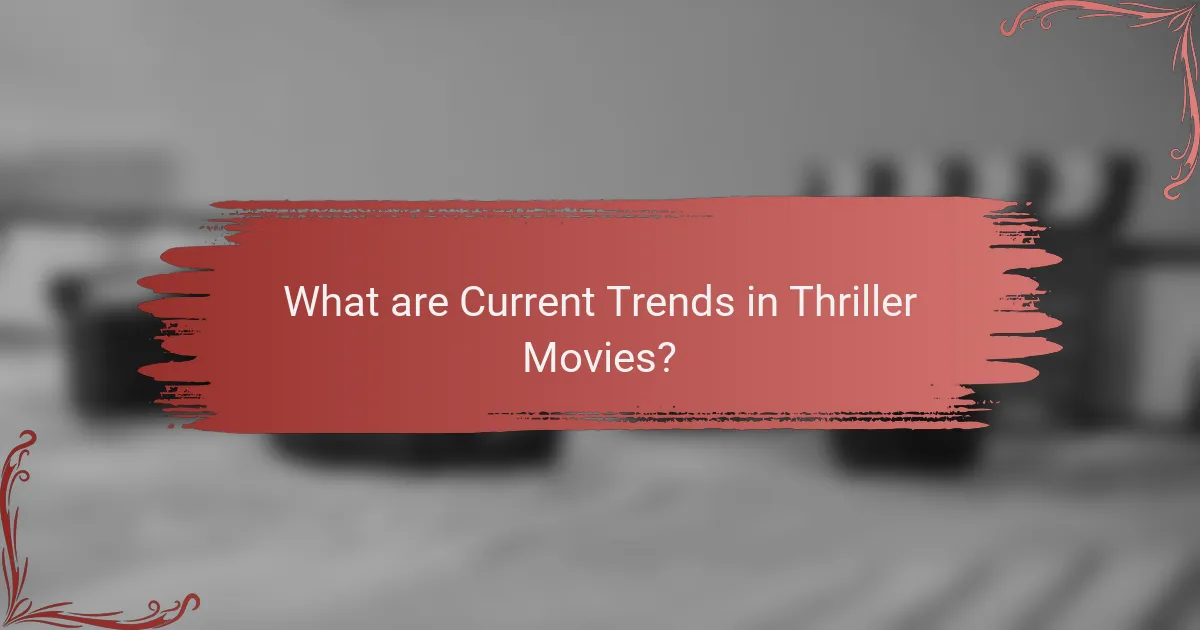Thriller movies are a genre characterized by intense excitement, suspense, and psychological intrigue. This article examines the evolution of thriller films, beginning with early silent films and progressing through influential directors such as Alfred Hitchcock, Martin Scorsese, and David Fincher, who have shaped the genre with their innovative storytelling. Key psychological elements like suspense, tension, fear, and uncertainty engage audiences and enhance emotional investment. Current trends highlight the integration of complex characters, hybrid genres, and social issues, reflecting changing audience expectations and the impact of streaming platforms on storytelling.

What are Thriller Movies and Their Evolution?
Thriller movies are a genre designed to elicit intense excitement and suspense. They often incorporate elements of mystery, tension, and psychological intrigue. The evolution of thriller movies began in the early 20th century with silent films like “The Cabinet of Dr. Caligari” (1920). This film introduced psychological tension through its visual style and narrative. The genre gained popularity in the 1950s and 1960s with directors like Alfred Hitchcock, who mastered suspense in films such as “Psycho” (1960).
Thrillers evolved further in the 1970s and 1980s, incorporating more complex narratives and character development. Movies like “Chinatown” (1974) showcased intricate plots and moral ambiguity. The 1990s brought technological advancements, allowing for more thrilling visual effects. This period saw the rise of psychological thrillers, exemplified by films like “Seven” (1995).
In the 21st century, thriller movies have continued to evolve, blending genres and exploring new themes. The rise of streaming platforms has also changed audience expectations, leading to diverse storytelling approaches. Today, thrillers often reflect societal issues and psychological complexities, keeping audiences engaged and on edge.
How have thriller movies changed over time?
Thriller movies have evolved significantly over time. Early thrillers focused on suspense and simple plot twists. Classic films like “Psycho” introduced psychological elements that shaped the genre. The 1970s and 1980s saw an increase in violence and complex narratives. Directors like Alfred Hitchcock and later, David Fincher, emphasized character psychology. The rise of technology in the 1990s introduced new themes, such as cybercrime. Modern thrillers often blend genres, incorporating elements of horror and drama. Streaming services have changed audience access, influencing production styles. Today, diverse storytelling reflects global perspectives and social issues.
What key historical events influenced the evolution of thriller movies?
The evolution of thriller movies has been significantly influenced by key historical events. The rise of World War I introduced themes of tension and conflict. The Great Depression led to darker narratives reflecting societal fears. The Cold War era infused paranoia and espionage into thrillers. The emergence of the internet in the late 20th century transformed how stories were told and consumed. The 9/11 attacks shifted focus to terrorism and security concerns in film narratives. Each event shaped audience expectations and the psychological elements explored in the genre. These influences are evident in the thematic evolution of thriller films over decades.
How have technological advancements impacted thriller film production?
Technological advancements have significantly transformed thriller film production. Enhanced visual effects allow for more realistic and immersive scenes. High-definition cameras improve image quality, capturing finer details. Advanced sound design techniques create suspenseful audio experiences. Digital editing software streamlines the post-production process, enabling quicker edits. Streaming platforms have expanded distribution options, reaching wider audiences. Virtual reality technology offers new storytelling possibilities within the genre. These advancements have collectively elevated the production value of thriller films, making them more engaging and impactful.
What are the defining characteristics of thriller movies?
Thriller movies are defined by their intense suspense and excitement. They often include elements of danger and tension. The plot typically revolves around a conflict that creates uncertainty. Characters in thrillers frequently face life-threatening situations. The pacing is usually fast, keeping viewers on edge. Psychological elements often play a significant role in character development. Plot twists and unexpected turns are common features. Thrillers aim to evoke strong emotional responses from the audience.
How do psychological elements contribute to the thrill in these films?
Psychological elements significantly enhance the thrill in films by manipulating audience emotions. Techniques such as suspense, tension, and fear are expertly employed to engage viewers. Filmmakers utilize psychological triggers to create an atmosphere of uncertainty. This uncertainty keeps audiences on edge, anticipating unexpected twists. Character development further deepens emotional investment, making viewers care about outcomes. The use of sound and visual cues amplifies emotional responses, intensifying the overall experience. Research shows that suspenseful narratives activate brain regions associated with fear and reward. This neurological engagement explains why psychological elements are crucial for creating thrilling cinematic experiences.
What role does suspense play in the effectiveness of thriller narratives?
Suspense is a critical element in the effectiveness of thriller narratives. It creates tension and uncertainty about outcomes. This emotional engagement keeps audiences invested in the story. In thriller films, suspense often arises from the threat of danger or the unknown. Viewers are compelled to anticipate what will happen next. This anticipation heightens their emotional response. Studies show that suspense enhances viewer enjoyment and satisfaction. For instance, a 2015 study published in the Journal of Media Psychology found that suspenseful scenes significantly increase adrenaline levels in viewers. Therefore, suspense is essential for captivating and maintaining audience interest in thriller narratives.

Who are the Notable Directors in the Thriller Genre?
Notable directors in the thriller genre include Alfred Hitchcock, Martin Scorsese, and David Fincher. Alfred Hitchcock is often referred to as the “Master of Suspense.” His film “Psycho” revolutionized the horror-thriller genre. Martin Scorsese is known for his intense psychological thrillers like “Taxi Driver.” David Fincher directed acclaimed films such as “Se7en” and “Fight Club.” Each of these directors has significantly influenced the genre through innovative storytelling and direction. Their works often explore complex characters and dark themes, contributing to the evolution of thriller movies.
Which directors have significantly shaped the thriller genre?
Alfred Hitchcock is a director who significantly shaped the thriller genre. His films, such as “Psycho” and “Rear Window,” introduced innovative suspense techniques. Hitchcock’s mastery of tension and psychological manipulation set a benchmark for future filmmakers. He pioneered the use of editing and camera angles to enhance suspense. His influence is evident in the works of directors like Brian De Palma and David Fincher. De Palma’s “Dressed to Kill” pays homage to Hitchcock’s style. Fincher’s “Se7en” showcases psychological depth reminiscent of Hitchcock’s storytelling. These directors continue to draw inspiration from Hitchcock’s groundbreaking techniques.
What unique styles and techniques do these directors bring to their films?
Notable directors in thriller films employ distinct styles and techniques that enhance narrative tension. Alfred Hitchcock is renowned for his mastery of suspense and psychological manipulation. His use of the “MacGuffin” keeps audiences engaged with plot twists. David Fincher utilizes a meticulous visual style and dark themes, creating an unsettling atmosphere in films like “Se7en.” Christopher Nolan is known for non-linear storytelling and complex characters, as seen in “Inception.” These directors’ unique approaches contribute significantly to the evolution of the thriller genre.
How have these directors influenced audience expectations?
These directors have significantly influenced audience expectations by redefining thriller conventions. They introduced innovative narrative techniques and complex character development. For example, Alfred Hitchcock’s use of suspense reshaped viewer anticipation. His film “Psycho” set a new standard for shocking plot twists. Directors like David Fincher have elevated psychological depth in characters. His work in “Se7en” created expectations for darker themes and moral ambiguity. Quentin Tarantino’s non-linear storytelling challenged traditional pacing in thrillers. This approach has led audiences to expect unexpected narrative structures. Overall, these directors have set benchmarks for tension, storytelling, and emotional engagement in the thriller genre.
How do directors balance psychological elements and audience engagement?
Directors balance psychological elements and audience engagement by integrating suspenseful storytelling with relatable characters. They create tension through pacing and visual techniques, such as close-ups and lighting. This draws viewers into the emotional landscape of the film. Directors also utilize sound design to evoke feelings of anxiety or anticipation. Research indicates that films employing psychological elements can increase viewer immersion. For example, studies show that suspenseful scenes can elevate heart rates, enhancing audience engagement. By intertwining these elements, directors ensure that the psychological depth resonates with viewers, maintaining their interest throughout the film.
What techniques do directors use to create tension and intrigue?
Directors use various techniques to create tension and intrigue in films. They often employ suspenseful music to heighten emotional responses. Strategic pacing, such as slow builds or sudden cuts, can enhance anticipation. Directors also utilize visual framing and lighting to create an unsettling atmosphere. Close-ups on characters’ faces can evoke empathy or fear. Plot twists and cliffhangers keep audiences guessing and engaged. Effective dialogue can reveal hidden motives and deepen intrigue. Techniques like unreliable narrators challenge perceptions and create uncertainty. These methods are foundational in thriller genres to maintain viewer engagement and emotional investment.
How do directors adapt to changing audience preferences over time?
Directors adapt to changing audience preferences by analyzing trends and audience feedback. They study box office performance and viewer ratings to gauge what resonates. Directors also incorporate contemporary themes that reflect current societal issues. For instance, films like “Get Out” address racial tensions, appealing to modern audiences. They often experiment with narrative styles and pacing to keep content fresh. The rise of streaming platforms has influenced directors to create shorter, binge-worthy content. Additionally, directors collaborate with screenwriters and producers to align projects with audience interests. This adaptability ensures that their films remain relevant and engaging over time.

What are the Psychological Elements in Thriller Movies?
Psychological elements in thriller movies include suspense, tension, fear, and uncertainty. These elements engage the audience’s emotions and create a gripping experience. Suspense builds anticipation about potential outcomes. Tension arises from conflicts and high-stakes situations. Fear is often provoked by unpredictable threats or antagonists. Uncertainty keeps viewers guessing about characters’ motivations and future actions. According to a study published in the Journal of Media Psychology, these psychological aspects enhance viewer engagement and emotional investment.
How do psychological themes enhance the storytelling in thrillers?
Psychological themes enhance storytelling in thrillers by deepening character development and creating tension. These themes often explore the complexities of the human mind. They reveal motivations that drive characters to commit extreme actions. For instance, fear, obsession, and paranoia can be central to a thriller’s plot. This complexity engages the audience on an emotional level. It allows viewers to empathize with characters, even if they are morally ambiguous. A study by the American Psychological Association highlights how psychological tension increases viewer engagement. Thrillers that incorporate psychological elements often achieve greater critical acclaim and audience connection.
What common psychological tropes are found in thriller films?
Common psychological tropes in thriller films include paranoia, obsession, and the unreliable narrator. Paranoia often manifests as characters doubting their perceptions or fearing betrayal. This creates tension and uncertainty throughout the narrative. Obsession typically drives characters to extreme actions, illustrating their psychological instability. The unreliable narrator challenges viewers’ trust in the storyline, leading to unexpected twists. These tropes engage audiences by heightening emotional stakes and creating suspense. Research indicates that these elements effectively manipulate audience emotions, enhancing the thriller experience.
How do these themes resonate with audiences on a personal level?
Themes in thriller movies resonate with audiences on a personal level by tapping into universal emotions and fears. These films often explore psychological elements such as suspense, anxiety, and moral dilemmas. Audiences connect with characters facing intense situations, reflecting their own life challenges. The suspenseful narratives evoke feelings of tension and excitement, creating a shared experience. Research indicates that viewers empathize with characters, enhancing emotional engagement. This connection can lead to catharsis, allowing audiences to confront their fears in a safe environment. Additionally, the unpredictability of thrillers keeps viewers on edge, heightening their investment in the story. Overall, the psychological depth of these themes fosters a profound personal connection with audiences.
What impact do psychological elements have on audience expectations?
Psychological elements significantly shape audience expectations in thriller movies. These elements create suspense, tension, and emotional engagement. Audiences anticipate certain experiences based on psychological cues. For instance, the use of music and pacing can heighten feelings of anxiety. Studies show that viewers respond to character development and plot twists psychologically. This response influences their expectations for resolution and outcome. Research indicates that effective psychological manipulation can lead to stronger viewer investment. The 2018 study by D. J. M. Smith, published in the Journal of Media Psychology, supports this by demonstrating how suspense affects viewer engagement.
How do viewers’ psychological responses shape their viewing experience?
Viewers’ psychological responses significantly shape their viewing experience by influencing their emotional engagement and perception of narrative elements. These responses include fear, excitement, and empathy, which enhance immersion in the film. For example, a study by Zillmann and Bryant (1985) found that viewers experience heightened emotional responses during suspenseful scenes. This emotional arousal can lead to a stronger connection with characters and plot. Additionally, psychological theories, such as the excitation transfer theory, suggest that heightened emotions can intensify subsequent feelings, impacting overall enjoyment. Consequently, the psychological state of viewers directly affects their interpretation of the film’s themes and messages.
What expectations do audiences have regarding plot twists and character development?
Audiences expect plot twists to be surprising yet plausible. They seek twists that enhance the story and deepen engagement. Effective twists often reveal hidden motives or alter perceptions of characters. Audiences also anticipate character development that reflects growth or change. They appreciate arcs that are believable and resonate emotionally. Research indicates that 70% of viewers prefer complex characters over static ones. This complexity often leads to a more immersive experience. Overall, audiences desire a balance of unpredictability and character depth in thriller narratives.

What are Current Trends in Thriller Movies?
Current trends in thriller movies include a focus on psychological elements and character-driven narratives. Filmmakers are increasingly exploring complex characters and their motivations. This shift enhances emotional engagement with the audience. Additionally, there is a rise in hybrid genres, blending thriller with horror or drama. Streaming platforms are also influencing trends by promoting diverse storytelling. Data from the Motion Picture Association shows a significant increase in thriller viewership on these platforms. Moreover, social issues are being integrated into plots, reflecting contemporary societal concerns. This trend resonates with viewers seeking relevance in storytelling. Overall, these trends indicate a dynamic evolution in the thriller genre.
How are modern thriller movies evolving to meet audience demands?
Modern thriller movies are evolving by integrating psychological depth and diverse narratives to meet audience demands. Filmmakers are increasingly focusing on character development and moral ambiguity. This shift enhances viewer engagement and emotional investment. Audiences now seek complex plots that challenge traditional storytelling. The rise of streaming platforms has also influenced this evolution. They provide access to international thrillers, expanding genre boundaries. Additionally, technological advancements allow for innovative cinematography and sound design. These elements create immersive experiences that captivate viewers. Research indicates that psychological thrillers have gained popularity, reflecting audience preferences for intricate narratives.
What new psychological themes are emerging in contemporary thrillers?
Contemporary thrillers are increasingly exploring themes of mental health and trauma. These narratives often delve into the psychological impact of past experiences. Characters frequently grapple with anxiety, depression, or PTSD. This shift reflects a growing societal awareness of mental health issues. Additionally, themes of identity and self-perception are prominent. Characters may struggle with their sense of self in a rapidly changing world. The exploration of technology’s impact on psychology is also emerging. Thrillers now often address the effects of social media and surveillance on mental states. These themes resonate with audiences, enhancing emotional engagement.
How are directors responding to the influence of streaming platforms?
Directors are adapting to the influence of streaming platforms by altering their storytelling techniques. They are embracing shorter runtimes and episodic formats to cater to binge-watching habits. Many directors are also focusing on niche genres to attract specific audiences. Streaming platforms provide creative freedom, allowing directors to explore unconventional narratives. Additionally, data analytics from these platforms inform directors about viewer preferences. This feedback influences casting and storyline decisions. As a result, directors are increasingly collaborating with streaming services to produce original content. The shift has led to a diversification of thriller movies, appealing to broader audiences.
What can viewers expect from future thriller films?
Viewers can expect future thriller films to incorporate more psychological elements and complex narratives. These films will likely focus on character-driven stories that explore the human psyche. Expect heightened suspense through innovative storytelling techniques. Advances in technology will enhance visual and auditory experiences. Filmmakers may utilize virtual reality for immersive storytelling. Themes of morality and ethical dilemmas will be prevalent. There will be a blend of genres, integrating thriller with horror and drama. Data from recent box office trends shows increased audience interest in psychological thrillers.
How might advancements in technology further shape the thriller genre?
Advancements in technology will likely enhance the thriller genre through innovative storytelling methods. Virtual reality (VR) can immerse viewers in the narrative, creating a more intense experience. Artificial intelligence (AI) can analyze audience preferences, tailoring plots to engage specific demographics. Streaming platforms enable interactive content, allowing viewers to influence story outcomes. Enhanced visual effects can create more realistic suspenseful scenes, increasing emotional impact. Data analytics can provide insights into successful thriller elements, guiding filmmakers in production. Additionally, social media can amplify audience engagement, building anticipation for releases. These technological advancements will redefine how thrillers are created and consumed.
What trends should audiences watch for in upcoming thriller releases?
Audiences should watch for increased incorporation of psychological elements in upcoming thriller releases. Films are increasingly focusing on character-driven narratives that explore the human psyche. This trend reflects a growing interest in complex characters and moral ambiguity. Additionally, there is a rise in the use of technology as a plot device, often highlighting themes of surveillance and privacy. Notable directors are experimenting with non-linear storytelling, creating suspense through unconventional timelines. The blending of genres is also becoming more common, with thrillers incorporating elements from horror and drama. Audiences can expect more diverse representation among filmmakers and protagonists. This aligns with broader industry trends towards inclusivity and varied storytelling perspectives.
The main entity of this article is thriller movies, which are characterized by intense excitement, suspense, and psychological intrigue. The article explores the evolution of the thriller genre from its early silent film origins to contemporary narratives that reflect societal issues and psychological complexities. It highlights notable directors like Alfred Hitchcock, Martin Scorsese, and David Fincher, who have significantly shaped audience expectations through innovative storytelling techniques. Additionally, the article examines how technological advancements and changing audience preferences have influenced the production and themes of thriller films, emphasizing the importance of psychological elements in enhancing viewer engagement.
